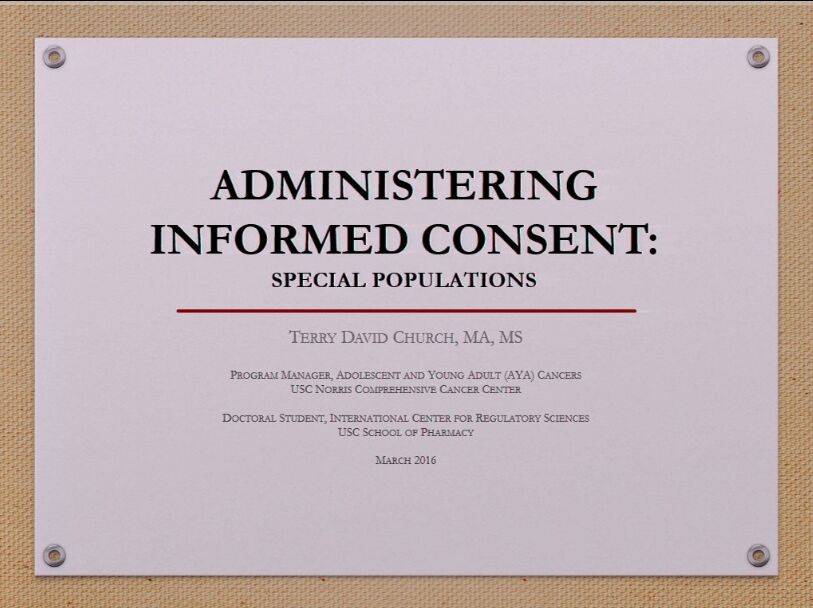- History of Informed Consents
- Long history development (20-30 documents to now 70 pages of informed consent)
- Belmont Report
- Respect for Persons (autonomy)
- Beneficence
- Distributive Justice
- Common Rule (a set series of parameters)
- IRB
- 5 members, one from scientific field, one from non-scientific field, and one who is not affiliated with institution
- Informed Consent constitutes of the following…
- This study involves what research
- Risks and discomforts
- Disclosure of appropriate alternative procedures
- Confidentiality of records will be maintained
- Compensation- if accidents happen, “no cost” liability
- Who to contact
- Participation is voluntary; refusal will not affect treatment; free to discontinue any time
- Cultural Considerations
- Defn: Culture influences how we view world around us via. Language, beliefs, and traditions
- Linguistic Cues - symbols ie. hand symbols (normal to one culture yet can be vulgar to another)
- Shared Decision Making (culture sets parameters for decision making)
- Informed Consent
- Pregnant woman’s consent may require both approval from woman and husband
- Disparities between races, sexes, and ages of those included in a study (inequality/misrepresentation)
- Cognitive ability is measured by competence and voluntariness
- Prisoners - have different rights from those who are not
- Emergency Care is not clinical care
- Must have legally authorized individual there when patient ability to provide consent is compromised
- Terminally Ill Patients - Expanded Availability and Therapeutic Intent
- Elderly/Aged Persons - No age that will make anyone ineligible, no specific regulations
- Students, Employees, and Normal Volunteers –
- Students- Cannot guarantee confidentiality or prior agreements/incentives ie. extra credit
- Employees- Coercion/Incentives issue, Confidentiality issue
- Normal Volunteers- Do not harm, maximize possible benefits and minimize possible harms
- Clinical Trials
- Using photos to communicate with children
- Interpreters with those who may not speak English
- What Can Go Wrong?!
- Lack of signatures
- Forged signatures
- Patient who may not understand completely the entire research
Regulatory Science Symposium: Clinical Trial Startup Session 4: Administering Informed Consents: Special Populations/Panel Discussion (2016)
In this session, we will discuss the significance of informed consent before ending with a panel discussion.
Course Syllabus/Topics
Acknowledgement
Accompanying text created by Annie Ly | Undergraduate Research Associate and Provost's First Generation Research Fellow | lyannie@usc.edu

